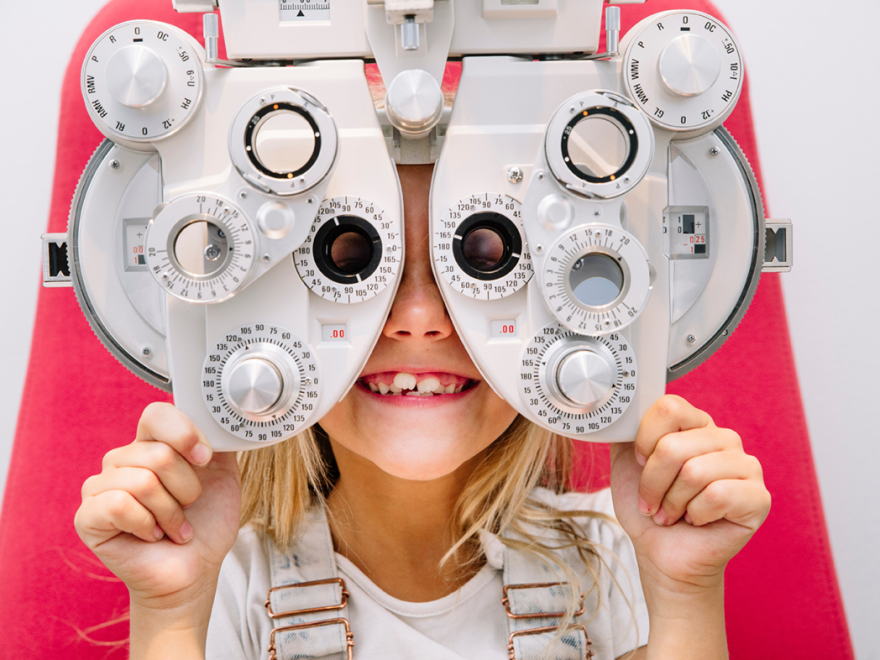As more than 735,000 three and four-year-olds across the UK receive their primary school offers today (16 April 2025), parents are being urged to book an eye test for their children before they begin school this September.
Strong vision plays a vital role in a child’s early learning, with studies showing that those with poor or uncorrected eyesight can absorb just half as much as their peers with good vision. Despite this, new research from the charity Eye Health UK reveals that a staggering 70% of parents don’t take their child for a sight test before school starts—if ever. That leaves over 100,000 children in the 2025 intake at risk of falling behind due to undiagnosed eye conditions.
David Cartwright, optometrist and chair of Eye Health UK, explains:
“One in five children in the UK has an undiagnosed vision problem that will hinder their learning and development. It’s often difficult for parents, carers or teachers to recognise when a child might be struggling with their eyesight; however, sight tests are free (on the NHS) for all children at high street optical practices. Children requiring vision correction are also entitled to an NHS voucher that can be used to pay for glasses.”
He continues:
“Starting school for the first time can feel stressful for parents and children but ensuring a child’s eyesight is up to scratch can help them settle-in quickly and aid their learning.”
Many parents still rely on schools to flag vision issues, but 21% admitted to assuming schools would carry out checks. In reality, school screenings are not a replacement for a full eye examination at an optician, and access is patchy—just 57% of Local Authorities in England offer screening, according to BIOS (British and Irish Orthoptic Society).
Undiagnosed vision issues can have serious consequences, not just academically but emotionally and socially. These include low self-esteem, headaches, difficulty forming friendships, and symptoms that overlap with dyslexia and ADHD. In some cases, problems with vision may even be misread as behavioural issues.
The charity’s Our Children’s Eye Health report also uncovered widespread confusion among parents. Around 64% don’t know how often a child needs their eyes tested, while 59% are unaware that high street opticians provide NHS sight tests free for children. Shockingly, 75% of parents had no idea that the NHS also offers free glasses through its voucher scheme.
Some parents assume no symptoms mean no issue—24% believe their child doesn’t need an eye test because their eyes “seem fine”. However, all children should undergo a sight test between ages three and four, and regularly after that, even if they show no signs of problems.
Awareness of common childhood conditions like short-sightedness (myopia), lazy eye (amblyopia), and squint (strabismus) remains low. Less than half of parents recognise that frequent headaches can be a sign of poor vision. Only a third associate head tilting with sight issues, and just 13% link poor drawing orientation on paper to vision challenges.
The report also highlights a gap in understanding about lifestyle and vision. For example, 86% of parents don’t know that spending two hours outdoors a day can help prevent myopia. Screen time, close-up activities, and a lack of visual stimulation in early years can all contribute to eye development problems.
David Cartwright adds:
“Limiting screen time and balancing activities that require eyes to focus on close objects, such as reading, with time outdoors as well as engaging in activities to stimulate vision, are crucial, especially during a child’s early years when their eyes continue to develop.”
Protecting young eyes from UV rays, as well as ensuring a diet rich in fruit, vegetables, and oily fish, can also support long-term vision health—yet only 32% of parents are aware of the importance of UV protection, and just 34% connect nutrition to eye health.
Worryingly, the report also found that 90% of parents would not think to consult their local optician first if their child had an eye concern—despite many practices offering NHS appointments for minor and urgent eye issues.
With so much at stake, experts are calling for parents to make routine eye tests from age three or four a priority, to ensure children get the best and healthiest start to school life.
Read the Our Children’s Eye Health report and learn more at www.visionmatters.org.uk

